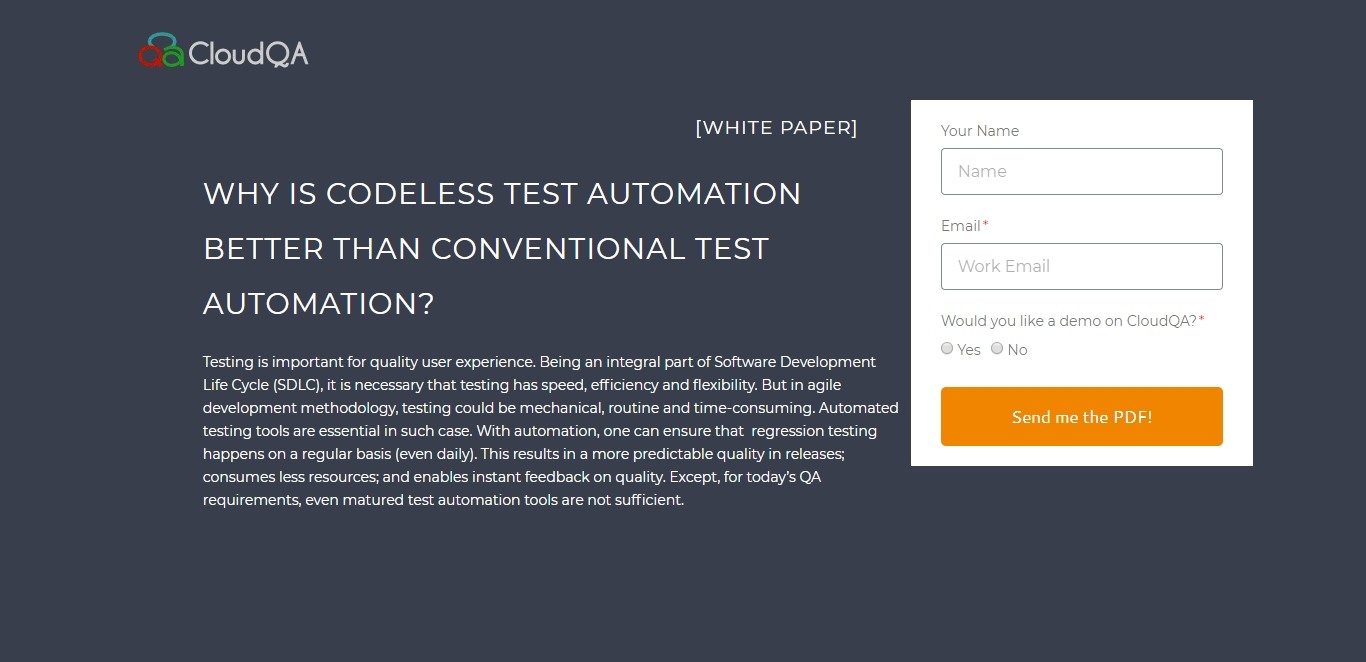The problems of Automation Testing in 2019
The problems of Automation Testing
Test automation is currently very popular for its ease of operation and how much it lowers costs in the long run. Testing frameworks like CloudQA have had a major impact on the workplace and how fast or efficiently software is developed by saving time, effort and money. However, as part of our ongoing series, we’ve come back to address some problems that most people will encounter at least once in their experiences with test automation. They are:
- Preparing a usable database.
Consistently repeatable results rely, to an extremely large degree, on the data that you use in your database. If you run into problems and suspect it’s a flaw in your data, it might be because you’re using a system that is different from your testing framework to set up the database in question. Additionally, many people use alien database contents which are outside the influence of the reach of their own project. Some projects may also have no dedicated databases used exclusively for automated tests. Manually entering the data stands to disrupt your results, and the testing process itself could end up corrupting data from other users on the same system. Finally, finding and setting up proper test data can be a tedious and difficult process. However, not putting in the effort could result in having to expend even more time and effort when things go awry.
- Accessing the CI server.
The CI or continuous integration environment is an integral part of all testing processes, CloudQA included (?). However, problems with access do occur. Oftentimes, developers responsible for performing configuration tasks don’t have full access to the system. Access can also be hampered if the same server is over-burdened by too many projects, slowing it down and even negatively impacting other projects on the same server. Selenium-based servers are especially prone to this. Another potential problem one can run into is not being able to access all parts of the system simultaneously. This is important, especially in cases of manual testing where multiple parts need to be accessed to effectively reproduce errors in the system.
- Web application testing.
Web application projects rely heavily on test automation nowadays. In these projects, often the test is rendered unstable, and the results vary widely even when the SuT (system under testing) has not been changed from one test to the next. If the SuT is based on a web framework that is hard to test. For example, some web frameworks change the id-values of HTML elements in every instance of someone accessing a page – variables like these will affect your test results. Frameworks like AJAX are also hard to test.
Testing automation saves you time, money and effort – if set up and run correctly. Often, people fault a system for not performing when in reality, the problem usually exists between the chair and the keyboard! It helps if you are aware of the potential problems that might arise on your journey with test automation so you can be prepared for the complications you might need to untangle. So how do you deal with these problems? Tune in to our next article, How to get rid of problems of automation testing, to find out!
If you want to learn more about being more productive with Test Automation, contact us at CloudQA ([email protected])
LIKE THIS POST SHARE IT WITH YOUR FRIENDS
RECENT POSTS
Guides

How To Select a Regression Testing Automation Tool For Web Applications
Regression testing is an essential component in a web application development cycle. However, it’s often a time-consuming and tedious task in the QA process.

Switching from Manual to Automated QA Testing
Do you or your team currently test manually and trying to break into test automation? In this article, we outline how can small QA teams make transition from manual to codeless testing to full fledged automated testing.

Why you can’t ignore test planning in agile?
An agile development process seems too dynamic to have a test plan. Most organisations with agile, specially startups, don’t take the documented approach for testing. So, are they losing on something?

Challenges of testing Single Page Applications with Selenium
Single-page web applications are popular for their ability to improve the user experience. Except, test automation for Single-page apps can be difficult and time-consuming. We’ll discuss how you can have a steady quality control without burning time and effort.

Why is Codeless Test Automation better than Conventional Test Automation?
Testing is important for quality user experience. Being an integral part of Software Development Life Cycle (SDLC), it is necessary that testing has speed, efficiency and flexibility. But in agile development methodology, testing could be mechanical, routine and time-consuming.







